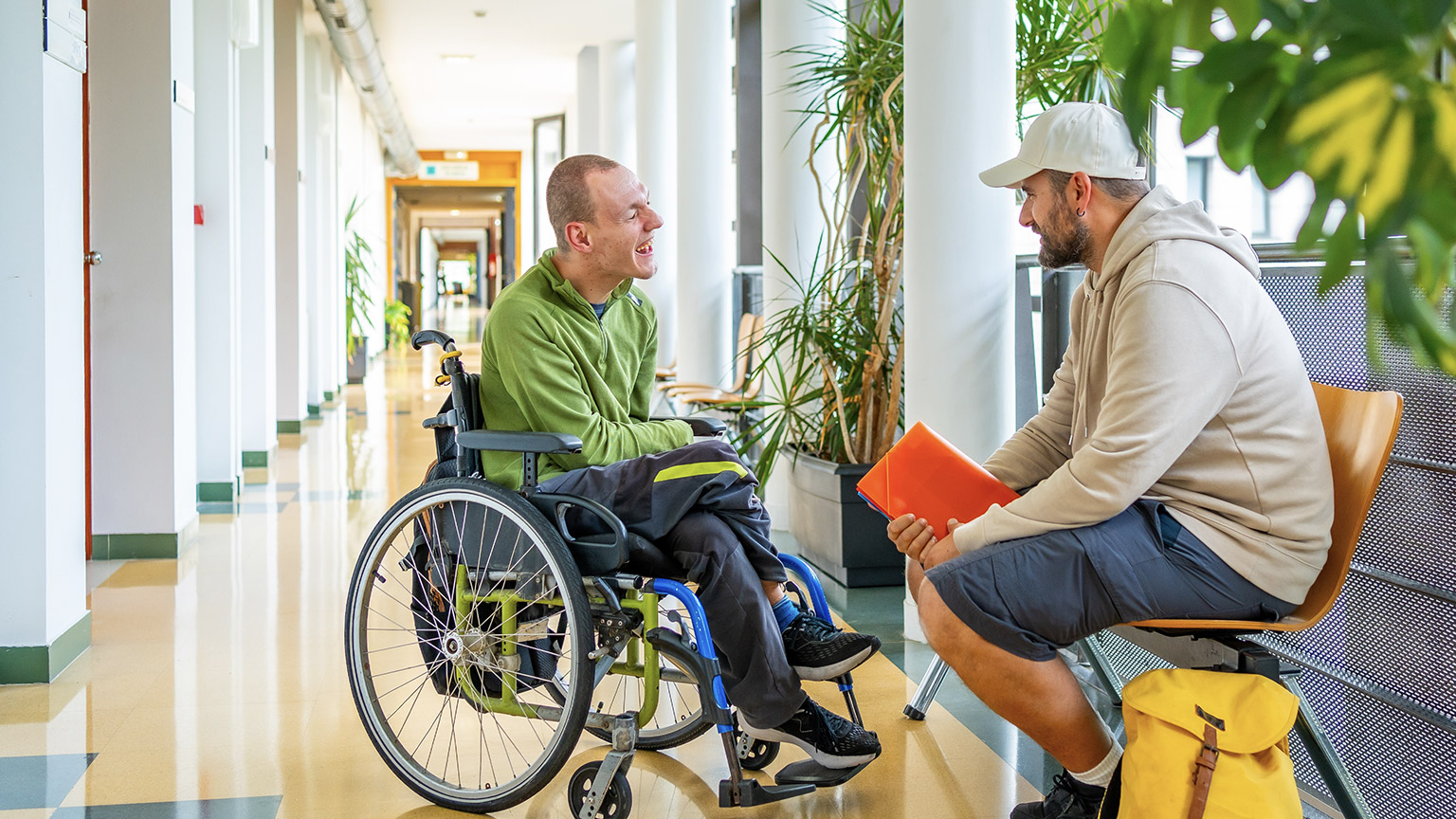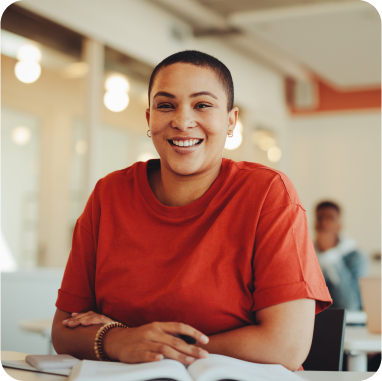
Welcome – Nau Mai, Haere Mai!
Hello, Kia ora, Talofa, Kumusta, Malo’etau lava, Kia Orana.
Nĭ hăo, Fakalofa Atu, Namaste, Bula, Sata srī akāla.
Congratulations on enrolling in the New Zealand Certificate of Health and Wellbeing programme.
The aim of this programme is to provide you with the skills and knowledge to work alongside service users accessing social and community services, and their family.
The programme is designed to support you on your learning journey into the healthcare industry. You will be guided by industry professionals who have extensive experience in healthcare and a passion for passing their knowledge and experience onto you so that you can hit the ground running when you enter the workplace.
This programme is made up of six courses;
- four compulsory courses and
- two courses related to the strand you have chosen to study.
The courses will introduce you to the healthcare sector, the relevance of Te Tiriti o Waitangi in healthcare and how to work alongside service user and their family accessing healthcare services with respect for their individual needs.
Your learning will include visits to healthcare providers and guest speakers from industry. You will also complete work-based learning so you can experience first-hand what it is like to be a health and wellbeing support worker.
Make the most of your time on this course, ask questions, seek guidance, and set goals that will help you to achieve!
Kei ōu ringaringa te ao - The world is yours.Whakataukī
Module - Kowae Overview
| Module Name | Assessment | Learning Hours |
|---|---|---|
| Introduction to the Aotearoa / NZ health and wellbeing sector | 01A1 01A2 01A3 01A4 |
200 |
| Communication and cultural identity | 02A1 02A2 02A3 02A4 |
200 |
| Professional and ethical practice | 03A1 03A2 03A3 03A4 |
200 |
| Tikanga and Hauora Māori | 04A1 04A2 04A3 04A4 |
200 |
| Introduction to Disability Work | 05A1 05A2 05A3 |
200 |
| Disability Support Work Practice | 06A1 06A2 |
200 |
How will you learn?
This is a blended learning programme meaning that some of your learning will occur on campus and some will occur online. The online learning hours are asynchronous. This means you complete them in your own time. There is no set study time, and learning takes place at different times for students- ākonga enrolled in the programme.
Total learning hours are 1200 hours. That is about 36 hours per week of full-time study, including self-directed learning (and work placement hours).
The learning hours include:
- reading, watching, and completing the activities on the online campus.
- completing assessments.
- self-directed practicals.
We will use the following words interchangeably throughout the course:
- ākonga or learners
- tangata or tangata whai ora or clients or patients
- whānau or family
- Aotearoa or New Zealand.
Learning Activities – Hei Mahi
There are a range of different activities to help you remember the learning content. Each type of activity has a specific function and purpose in how it will help you learn and the kind of feedback that you will get back from it. Types of activities could include:
- Quizzes: these test how much you have remembered and provide you with instant feedback. Quizzes are set so that you can do them as many times as you want – your answers are not saved so you may want to take your own notes as you complete each one.
- Forum Activities: these activities are designed for you to think about what you have learned and apply your knowledge to situations that you might experience in the work place. You will be able to get feedback from your tutor and your classmates about your ideas, so participating in the forum activities is a great way to speed up your learning.
- Research Activities: these activities are designed to increase your confidence with finding out information on your own. They usually take the form of questions that ask you to find a specific answer: your feedback will come from the amount of research that you do: if you visit three websites and they all say the same or similar thing, you can feel confident that you have found a good answer to the research question. This will be extremely useful for you if you plan to do further study after completing this programme.
- Reflection Activities: these tasks will often occur near the end of a set piece of learning and are intended for you to think about how useful the information was to your learning goals, and whether there is anything that you are still unsure of or would like further information on or help with. There will be a forum where you can ask your tutor (or your classmates) any questions that come from your reflections.
- Note-taking Activities: at key points in the learning you will be prompted to make your own notes that you will be able to keep. This is a great way to help you remember what you have learned, which is why we have made this a learning activity instead of providing pre-written downloadable notes. It’s more empowering for you as a learner to write notes in a way that is unique to you. It is also an essential study skill for anyone thinking about more study when you have completed this course. This type of activity is a form of self-feedback, but also may also generate questions that you will want to ask your tutor or classmates.
- Literacy and Numeracy Activities: often there are specific literacy or numeracy skills required for jobs in the work place. The particular literacy or numeracy skills will either be the focus of a learning activity or will be included as part of one of the activity types listed above. Practicing these will give you an edge when job-hunting! Feedback that you receive will depend on the type of activity.
Trigger Warning
As a healthcare student, you need to be aware that you are exposed to sensitive and possibly triggering themes on health and wellbeing. These topics could include subjects such as abuse and neglect. There could also be case study examples that can be uncomfortable, disturbing or confronting to deal with.
Please make sure to look after yourself and approach with care when you go through these potential trigger themes.
We will use Trigger Warning callout boxes (like this one) prior to any sensitive or triggering subjects.
Assessments - Aromatawai
A total of 120 credits are awarded for the programme.
There are 20 assessments to complete. Assessments will be awarded an achieved or not-achieved result. All learning outcomes must be met to obtain an achieved result. All assessments must be completed in full, with all answers correct, for an achieved result.
All assessments will be handed out by your tutor in the classroom. They will provide you with information about completing and submitting them.
Assessments are recorded as follows:
- Achieved – all work/unit has been achieved to the standards set in the assessment and performance criteria.
- Not Achieved – the student/ākonga has yet to complete the relevant work to be awarded the assessment or unit.
Work Placement
You will complete a minimum of 200 hours across the programme as part of your study hours. The work placement allows you to be exposed to the health and wellbeing workplace with the goal of linking the practical components of the programme to the theoretical content learned. The practical hours are valuable since they give you a taste of the industry and also help you to become job-ready.
Studying at Level 4
|
|
|
|
|
 |
|
|
|
|
||
Graduates of this qualification will be able to:
- engage and communicate with service user and family accessing social and community services in a manner which respects their socio-cultural identity, experiences and self-knowledge
- apply knowledge of Te Tiriti o Waitangi to honour the history and context of Māori as tangata whenua and apply knowledge of person-whānau interconnectedness to own role in a health and wellbeing setting
- demonstrate self-awareness, reflective practice, personal leadership and self-care in a health and wellbeing setting
- actively contribute to a culture of professionalism, safety and quality in a health and wellbeing organisation
- use knowledge of the aims and purpose(s) of the wider health and wellbeing sectors to reflect on their impact on own role.
Graduates of the Community Health Work strand will also be able to:
- apply community health work tools and strategies when working alongside service user and family to support autonomy and promote the self-determination of health and wellbeing.
- Graduates of the Mental Health and Addiction strand will also be able to:
- apply mental health and/or addiction tools and strategies when working alongside service user and family to support autonomy, foster hope, and develop resilience.
Graduates of the Disability Support strand will also be able to:
- Apply disability tools and strategies when working alongside tangata, family and/or whānau to support autonomy, identify goals and opportunities to overcome challenges to enable good lives.
Graduates will be awarded the:
New Zealand Certificate in Health and Wellbeing (Social and Community Services) (Level 4)
with a strand in either:
- Community Health Work
- Mental Health and Addiction Support.
- Disability Support
Graduates will also be able to progress to further study (e.g., New Zealand Certificate in Public Health and Health Promotion (Level 5)) and/or an entry level role in a range of health support contexts of Aotearoa New Zealand (e.g., mental health and addiction support workers, tamariki ora support worker).
A graduate of a Level 4 certificate is able to:
- demonstrate broad operational and theoretical knowledge in a field of work or study
- select and apply solutions to familiar and sometimes unfamiliar problems
- apply a range of communication skills relevant to the field of work or study
- demonstrate the self-management of learning and performance under broad guidance
- demonstrate some responsibility for performance of others
- select and apply a range of standard and non-standard processes relevant to the field of work or study.
We’re here to help
If you're ever unsure about something or need assistance, please don't hesitate to contact your tutor. You can send them a message via email or via the 💬 messages feature on the top right corner of the online campus.